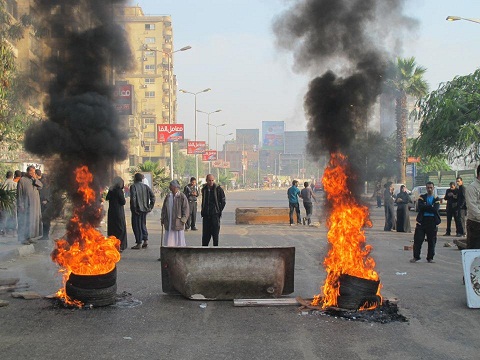CAIRO: Fathi Sorour, speaker of the People’s Assembly, raised eyebrows this week with comments he made at a counter-terrorism conference which suggested that Egypt’s draft anti-terror law, slated to replace 26-year-old Emergency Law by next year, could be used to prosecute journalists and media outlets.
The Muslim Brotherhood was quick to condemn the statements, although media observers affiliated with the National Democratic Party of President Hosni Mubarak say there is little cause for alarm.
“If any journalist is part of a terrorist cell or terrorist organization and is seen to be spreading the ideas of his organization, he will suffer the full extent of the anti-terrorism law, said Sorour at the First Annual Anti-Terrorism Conference held at the Al-Gomhouria Studies Center. The event drew anti-terror experts from across the Arab world.
Responding to concerns that any prosecutions under the law would unfairly target the Muslim Brotherhood, which has been banned since 1954 but long tolerated, Sorour sought to reassure the audience.
“The Muslim Brotherhood is permitted to have political activities as long as they are within the legal parameters and as long as there are no covert activities that could be classified as terrorist, he said. “The freedom to demonstrate and express one’s opinion democratically will always be upheld, but anything other than that will be considered criminal activity.
He also told the audience that “the Brotherhood have political objectives, so they should set up a political party. Sorour declined to comment on whether the state would allow them to do so.
Later in his remarks, Sorour told the conference, “Every nation has the right to fight terrorism in order to protect its sovereignty, security and stability. Fighting terrorism is a means of protecting human rights, and sometimes, in special circumstances, it supersedes personal rights and freedoms.
When asked about potential abuse of anti-terror legislation by security forces, Sorour said: “Violations could take place, but they are the exception to the rule.
Ibrahim El Houdaiby, an advisor to the Muslim Brotherhood and contributor to its website, www.ikhwanweb.com, does not find these reassurances convincing.
While he maintains that the Muslim Brotherhood is not a terrorist organization, Houdaiby says the vagueness of the Speaker’s language is cause for alarm.
“There was no direct reference to the Muslim Brotherhood in Fathi Sorour’s statements, he told The Daily Star Egypt. “He spoke about any outlawed terrorist organization, and we are not terrorists. We are a civil organization that has a clear agenda of reform and a moderate orientation. “But he used very broad language that could be applied to anybody, so considering this I am sure it will be used to crackdown on the Muslim Brotherhood, he continued. “Looking at Sorour’s exact words against terrorism, of course we support them. But given the regime’s history, they will just be used to crackdown on opposition. That is a threat to all opposition groups, not just the Brotherhood.
According to Hussein Amin, Chairman of the Department of Mass Communications at the American University in Cairo and a member of the Policy Committee of the National Democratic Party, Sorour’s comments are not a threat to anybody.
“These laws that Sorour is talking about have not even been passed yet. They still have to be discussed in the People’s Assembly, he said. “What Sorour said are just his own comments, what he thinks the laws will deal with. He’s just thinking out loud.
While he does not see the comments as an anti-Brotherhood maneuver in the making, Amin agrees that any legal move towards restricting freedom of the press would be bad for Egypt.
“I don’t think there should be anything restricting freedom of expression and the press, he said. “Are we going forward or backwards?
“In an era where anyone can say anything anywhere because of the internet and transnational media, why should we put restrictions on what journalists can say? He continued. “What is going to be said is going to be said, whether we like it or not. Freedom of expression is one of the most important pillars of society, especially in a society where people have access to broadcasting and the transnational media.
According to Amin, in a vibrant media environment in which television, radio, print and the internet all compete for the same stories, regulation of the media is important. But anti-terror legislation is not the right way to do it.
“Although there is a need for regulation, I don’t think that the governing body for the press should be the anti-terrorism law, he said. “Maybe then more people would go to the political extreme because of stupid actions taken by the government to limit the free expression of journalists.
On this, he and El Houdaiby seem to agree.
“Because of the regime’s continued crackdown on moderates and opposition groups, they are paving the way for radicals to emerge, said El Houdaiby. “They are encouraging radical sentiments.

